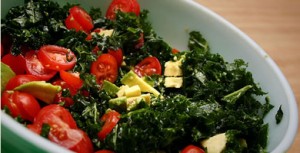 Your mother always told you to “eat your vegetables” and its no surprise that she was right. Interestingly enough, the compounds in fruits and vegetables (called polyphenols) that give them their beautiful colours, flavours and taste are the same compounds that have incredible healing properties.
Your mother always told you to “eat your vegetables” and its no surprise that she was right. Interestingly enough, the compounds in fruits and vegetables (called polyphenols) that give them their beautiful colours, flavours and taste are the same compounds that have incredible healing properties.
Foods with high levels of healing polyphenols include soybeans, cauliflower, broccoli, cabbage, green tea, fava beans, kale, grapes and the spice turmeric.
Sipping approximately three cups of green tea has been shown to reverse breast cancer in laboratory mice by suppressing the gene that triggers the disease. A daily cup of broccoli sprouts, which has sulforaphane as an active compound, has been shown to reduce the risk of developing many cancers.
The full review is published in the journal Clinical Epigenetics and research more about angiogenesis and epigenetics to discover more about the healing properties of polyphenols.
Photo from https://therawendeavor.com/?p=122 – Yummy Kale Salad recipe!
